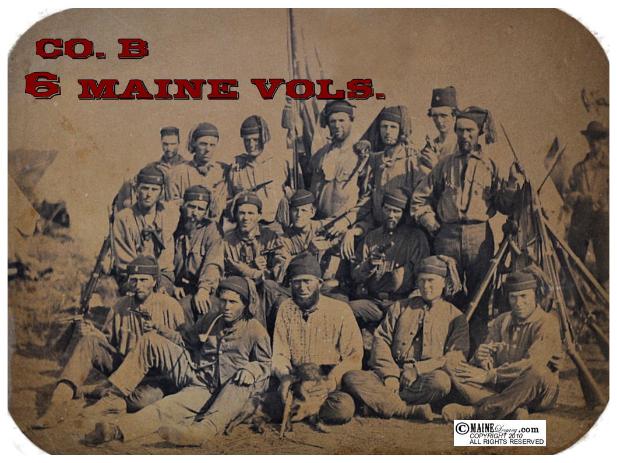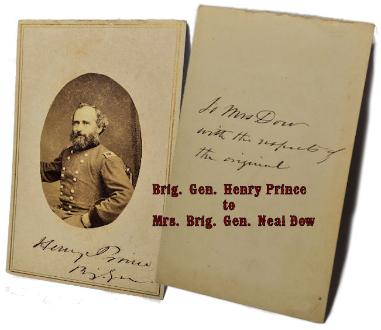


A reflection of the early war Maine volunteer as opposed to the more conventionally uniformed regulation soldier who would follow, this hitherto unpublished view of a ragtag Co. B, 6th Maine Volunteer Infantry has been one of our favorites. Unmarked as to photographer or location we are fortunately provided with a family notation that identifies the group and tells us that the young fellow with the clay pipe, second from our left, front row, is eighteen year old Dorephus (Dorphis) l. Fields. Composed almost entirely of the hardy lumbermen of the Penobscot valley and Maine down-easters who were quick to respond to Lincoln’s first call to arms, the 6th Maine Volunteers would see some of the heaviest action of the Civil War. Co. B shown here was made up entirely of Ellsworth residents. One historian wrote of them that hard physical labor had been a necessity of life and fighting was a sport. With a population of approximately 4,600 souls when the Civil War broke, Ellsworth would provide 653 of their hardiest to the Union cause. In the labor intensive 1860s one can only imagine the impact of the loss of service of this number of able bodied would have on the citizens of this Maine river community. Before the war’s end 40 of the towns finest would be killed or mortally wounded, 47 would die of disease with another 66 of its citizens disabled. The toll of such in a time when survival and anything like reasonable prosperity was so dependent on physical labor is nearly unimaginable today. The citizens of Ellsworth were not alone in their sacrifice as Maine community upon community offered up their finest to the Union effort. Some 73,000 Maine men served in the Civil War comprising some of the hardest fought Regiments of the Union Army.
Shown at the right as a Brig. General, Maine Down-easter, Henry Prince declined the colonelcy of the newly formed 6th Maine choosing instead to preserve his commission in the U S Army. A graduate of West Point in 1835 by the time of the Civil War this Eastport, Maine native had served in the Seminole & Creek Indian Wars and the Mexican War. Wounded in action against the Indians in 1836, Prince was wounded in the Mexican War such that he was painfully incapacitated for three years. By the Civil War the aging veteran like rallied to serve his country yet again. Commissioned Brig. General of Volunteers and despite his still painful wounds of the Mexican War, Prince served valiantly through the Civil War remaining in the Army until retirement in 1877. The old war horse paid the final toll, when wracked with the pain of his old wounds; Henry Prince took his own life on August 19, 1892.







